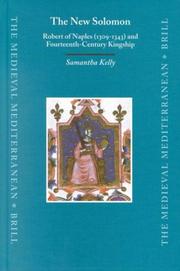| Listing 1 - 10 of 10 |
Sort by
|
Book
ISBN: 9780801453861 0801453860 9781501701009 1501701002 1501700995 9781501700996 Year: 2015 Publisher: Ithaca
Abstract | Keywords | Export | Availability | Bookmark
 Loading...
Loading...Choose an application
- Reference Manager
- EndNote
- RefWorks (Direct export to RefWorks)
In 1343 a seventeen-year-old girl named Johanna (1326-1382) ascended the Neapolitan throne, becoming the ruling monarch of one of medieval Europe's most important polities. For nearly forty years, she held her throne and the avid attention of her contemporaries. Their varied responses to her reign created a reputation that made Johanna the most notorious woman in Europe during her lifetime. In From She-Wolf to Martyr, Elizabeth Casteen examines Johanna's evolving, problematic reputation and uses it as a lens through which to analyze often-contradictory late-medieval conceptions of rulership, authority, and femininity. When Johanna inherited the Neapolitan throne from her grandfather, many questioned both her right to and her suitability for her throne. After the murder of her first husband, Johanna quickly became infamous as a she-wolf-a violent, predatory, sexually licentious woman. Yet, she also eventually gained fame as a wise, pious, and able queen. Contemporaries-including Francesco Petrarch, Giovanni Boccaccio, Birgitta of Sweden, and Catherine of Siena-were fascinated by Johanna. Drawing on a wide range of textual and visual sources, Casteen reconstructs the fourteenth-century conversation about Johanna and tracks the role she played in her time's cultural imaginary. She argues that despite Johanna's modern reputation for indolence and incompetence, she crafted a new model of female sovereignty that many of her contemporaries accepted and even lauded.
Queens --- Royalty --- Rulers --- Sovereigns --- Monarchy --- Women --- Courts and courtiers --- Empresses --- Kings and rulers --- Joanna --- Naples (Kingdom) --- History --- Johanna --- Regno di Napoli --- Napoli (Kingdom) --- Sicily (Italy) --- Kingdom of the Two Sicilies
Book
ISBN: 3110730901 Year: 2021 Publisher: Berlin/Boston : Walter de Gruyter GmbH,
Abstract | Keywords | Export | Availability | Bookmark
 Loading...
Loading...Choose an application
- Reference Manager
- EndNote
- RefWorks (Direct export to RefWorks)
In der 1905 begründeten Reihe Bibliothek des Deutschen Historischen Instituts in Rom erscheinen wissenschaftliche Monographien und Aufsatzbände zur italienischen bzw. italienisch-deutschen Geschichte vom frühen Mittelalter bis zur jüngsten Vergangenheit.
HISTORY / Medieval. --- Cities and Communes. --- Historiography. --- Kingdom of Sicily. --- Papal History. --- Roger II of Sicily. --- Alessandro, --- Falcone, --- Naples (Kingdom) --- History --- Regno di Napoli --- Napoli (Kingdom) --- Sicily (Italy) --- Kingdom of the Two Sicilies
Book
ISSN: 09285520 ISBN: 9789004224063 9004224068 9786613366122 1283366126 900422405X Year: 2012 Volume: 94 Publisher: Leiden: Brill,
Abstract | Keywords | Export | Availability | Bookmark
 Loading...
Loading...Choose an application
- Reference Manager
- EndNote
- RefWorks (Direct export to RefWorks)
The first full-length study of mainland southern Italy's domestic market in the late Middle Ages, this book discusses the interaction between population, the market, and the region's institutional framework, in the context of the impact of the late medieval 'crisis' on the European economy. Based on new or little-used documentary evidence, it adopts an interdisciplinary approach and combines economic history with elements of economic theory to reassess common knowledge on demographic and urbanization trends, the organization of the domestic market, the role of the state, and on actual patterns of agricultural production, industrial activity and commercial itineraries. The result is a fresh look at the late medieval economy of the kingdom of Naples, which, it seems now, is worth studying for its own merit.
Naples (Kingdom) --- Naples (Royaume) --- Economic conditions --- Social conditions. --- Conditions économiques --- Conditions sociales --- Social conditions --- Conditions économiques --- BUSINESS & ECONOMICS / Economic Conditions. --- BUSINESS & ECONOMICS / Economic History. --- BUSINESS & ECONOMICS / Economics / Comparative. --- POLITICAL SCIENCE / Economic Conditions. --- Economic conditions. --- Regno di Napoli --- Napoli (Kingdom) --- Sicily (Italy) --- Kingdom of the Two Sicilies --- Naples (Kingdom) - Economic conditions --- Naples (Kingdom) - Social conditions

ISSN: 09285520 ISBN: 9004129456 9786610467198 1423712242 1280467193 904740193X 9781423712244 9789047401933 9789004129450 9781280467196 6610467196 Year: 2003 Volume: 48 Publisher: Leiden: Brill,
Abstract | Keywords | Export | Availability | Bookmark
 Loading...
Loading...Choose an application
- Reference Manager
- EndNote
- RefWorks (Direct export to RefWorks)
Treating kingship as a joint enterprise of king and court, this study draws on a range of sources from chronicles and popular poetry to diplomatic and archival records, to reassess the major issues of Robert's reign and underscore the importance of image-making and negotiation to his rule.
Robert, --- Naples (Kingdom) --- Kings and rulers --- Biography --- History --- Naples (Royaume) --- Rois et souverains --- Biographie --- Histoire --- Roberto, --- Regno di Napoli --- Napoli (Kingdom) --- Sicily (Italy) --- Kingdom of the Two Sicilies --- ROBERT (ROI DE NAPLES), CA. 1275-1343 --- NAPLES (ITALIE), ROYAUME --- ROIS ET SOUVERAINS --- BIOGRAPHIE --- HISTOIRE --- 1268-1442 (DYNASTIE ANGEVINE) --- Robert, - King of Naples, - ca. 1275-1343

ISBN: 144268853X 9781442688537 9780802092885 0802092888 1442691719 Year: 2008 Publisher: Toronto
Abstract | Keywords | Export | Availability | Bookmark
 Loading...
Loading...Choose an application
- Reference Manager
- EndNote
- RefWorks (Direct export to RefWorks)
"In Love, Self-Deceit, and Money, Koen Stapelbroek reconstructs the early Neapolitan Enlightenment debate on the morality of market societies, a debate that hinged on the preservation of Naples' independent statehood in a global arena of commercial and military competition. Galiani rejected the opinions of many of his contemporaries regarding the moral and economic dangers threatening Naples, and, in his Della moneta (1751), he justified the systems set in place by the Neapolitan government. With reference to early, previously unstudied lectures on self-deceptive 'Platonic love, ' Stapelbroek examines Galiani's role in the wider debate, arguing that his early work in moral philosophy and history suggests a great deal about his political-economic stance, including his assertion that money is the ultimate ordering principle in the universe."--Jacket.
Commerce --- Enlightenment --- Aufklärung --- Eighteenth century --- Philosophy, Modern --- Rationalism --- Trade --- Economics --- Business --- Transportation --- Moral and ethical aspects. --- Galiani, Ferdinando, --- Galeota, Onofrio, --- Galiani, --- Galiani, Ferdinand, --- Political and social views. --- Naples (Kingdom) --- Regno di Napoli --- Napoli (Kingdom) --- Sicily (Italy) --- Kingdom of the Two Sicilies --- History --- Economic conditions --- Politics and government --- Traffic (Commerce) --- Merchants
Book

ISBN: 9791036577239 Year: 2021 Publisher: Aix-en-Provence : Presses universitaires de Provence,
Abstract | Keywords | Export | Availability | Bookmark
 Loading...
Loading...Choose an application
- Reference Manager
- EndNote
- RefWorks (Direct export to RefWorks)
Les mutations en cours de nos sociétés avivent le débat sur les identités politiques. Leur origine médiévale bénéficie ainsi d’un intérêt accru. La question s’inscrit simultanément dans une nouvelle histoire des pouvoirs, qui cherche leurs fondements. Entre ces bases, les sentiments d’appartenance tirent un rôle majeur. L’enjeu s’imposa avec acuité aux Capétiens de Sicile, ou « Angevins », entre XIIIe et XVe siècle. Ils gouvernaient des territoires dispersés de la Grèce voire de la Terre sainte à l’Anjou. Ils étaient d’origine étrangère à leurs peuples. Ils devaient gagner la reconnaissance de communautés et d’aristocraties multiples. Ils assirent pourtant une autorité acceptée pour légitime parce que capable d’unir autour de valeurs communes, tout en composant avec différentes traditions identitaires. Les seize contributions ici publiées analysent cette délicate combinaison, en privilégiant Provence et partie continentale du royaume de Sicile comme centres de gravité des domaines « angevins ».
Anjou, House of --- History --- Provence (France) --- Naples (Kingdom) --- Kings and rulers --- Politics and government --- Regno di Napoli --- Napoli (Kingdom) --- Sicily (Italy) --- Kingdom of the Two Sicilies --- Prouince (France) --- Province (France) --- Provenza (France) --- Provence-Côte d'Azur (France) --- Medieval & Renaissance Studies --- Sicile --- Provence --- idées politiques --- mutation --- pouvoir --- Anjou --- angevin --- société
Book
ISBN: 0801461359 0801460875 9780801460876 9780801449161 0801449162 9780801461354 Year: 2011 Publisher: Ithaca, NY
Abstract | Keywords | Export | Availability | Bookmark
 Loading...
Loading...Choose an application
- Reference Manager
- EndNote
- RefWorks (Direct export to RefWorks)
Vico and Naples is an intellectual portrait of the Neapolitan philosopher Giambattista Vico (1668-1744) that reveals the politics and motivations of one of Europe's first scientists of society. According to the commonplaces of the literature on the Neapolitan, Vico was a solitary figure who, at a remove from the political life of his larger community, steeped himself in the recondite debates of classical scholarship to produce his magnum opus, the New Science. Barbara Ann Naddeo shows, however, that at the outset of his career Vico was deeply engaged in the often-tumultuous life of his great city and that his experiences of civic crises shaped his inquiry into the origins and development of human society.With its attention to Vico's historical, rhetorical, and jurisprudential texts, this book recovers a Vico who was keenly attuned to the social changes transforming the political culture of his native city. He understood the crisis of the city's corporate social order and described the new social groupings that would shape its future. In Naddeo's pages, Vico comes alive as a prescient judge of his city and the political conundrum of Europe's burgeoning metropolises. He was dedicated to the acknowledgment and juridical remedy of Naples' vexing social divisions and ills. Naddeo also presents biographical vignettes illuminating Vico's role as a Professor of Rhetoric at the University of Naples and his bid for the prestigious Morning Chair of Civil Law, which foundered on the directives of the Habsburgs and the politics of his native city. Rich with period detail, this book is a compelling and vivid reconstruction of Vico's life and times and of the origins of his powerful notion of the social.
Cities and towns --- Social sciences --- Global cities --- Municipalities --- Towns --- Urban areas --- Urban systems --- Human settlements --- Sociology, Urban --- Behavioral sciences --- Human sciences --- Sciences, Social --- Social science --- Social studies --- Civilization --- Philosophy --- History. --- Vico, Giambattista, --- Rome --- Naples (Kingdom) --- Regno di Napoli --- Napoli (Kingdom) --- Sicily (Italy) --- Kingdom of the Two Sicilies --- Historiography. --- Vico, G. --- Vico, G. B. --- Vico, Giovanni Battista, --- Vico, Juan Bautista, --- Pikʻo, --- Vico, Giovan Battista, --- ויקו, ג׳מבטיסטה, --- Weike, --- 维柯,
Book
ISBN: 1442689528 9781442689527 9780802098672 0802098673 1442692979 1487526091 Year: 2008 Publisher: Toronto
Abstract | Keywords | Export | Availability | Bookmark
 Loading...
Loading...Choose an application
- Reference Manager
- EndNote
- RefWorks (Direct export to RefWorks)
Crews focuses on Valdes's service as an imperial courtier and how his employments in Italy influenced both Spanish diplomacy and his own religious thought.
Authors, Spanish --- Renaissance --- Valdés, Juan de, --- De Valdés, Juan, --- Val D'Esso, Jan de, --- Valdés, Juan, --- Valdesius, Johannes, --- Valdesso, Giovanni, --- Valdesso, John, --- Holy Roman Empire --- Papal States --- Naples (Kingdom) --- Italy --- Regno di Napoli --- Napoli (Kingdom) --- Sicily (Italy) --- Kingdom of the Two Sicilies --- Church States --- States of the Church --- Legazioni --- Stato pontificio --- Kirchenstaat --- Papal State --- Stati pontifici --- Stati della Chiesa --- Heiliges Römisches Reich Deutscher Nation --- Heiliges Römisches Reich --- Svi︠a︡shchennai︠a︡ Rimskai︠a︡ Imperii︠a︡ --- Imperium Romano Germanicum --- S.R.I. --- Sacrum Romanum Imperium --- Austria --- Germany --- Politics and government --- History --- Church history --- Court and courtiers --- BIOGRAPHY & AUTOBIOGRAPHY / Historical.

ISBN: 1315263793 1351962124 9781351962124 9781315263793 8870413578 9788870413571 9781351962124 1351962108 1351962116 9788870413571 9781351962100 9781351962117 Year: 2016 Publisher: Abingdon, Oxon New York, NY
Abstract | Keywords | Export | Availability | Bookmark
 Loading...
Loading...Choose an application
- Reference Manager
- EndNote
- RefWorks (Direct export to RefWorks)
Jesuits --- イエズス会 --- カトリック イエズス会 --- Compagnie de Jésus --- Compañia de Jesus --- Gesellschaft Jesu --- Jesuitas --- Jesuiten --- Jesuiti --- Jezuïten --- Jésuites --- Paters Jezuïten --- Societeit van Jezus --- Society of Jesus --- Naples (Kingdom) --- Regno di Napoli --- Napoli (Kingdom) --- Sicily (Italy) --- Kingdom of the Two Sicilies --- Church history. --- Missions --- Missionaries --- 271.5 <45 NAPOLI> --- #GBIB: jesuitica --- 271.5 <45 NAPOLI> Jezuïeten--Italië--NAPOLI --- Jezuïeten--Italië--Napoli --- Religious adherents --- Christian missions --- Christianity --- Missions, Foreign --- Religion --- Theology, Practical --- Proselytizing --- History --- Jezuïeten--Italië--NAPOLI --- Jesuits. --- Naples (Italy) --- Napulj (Italy) --- Neapel (Italy) --- Neapolis (Italy) --- Nápoly (Italy) --- Napoli (Italy) --- Nápoles (Italy) --- Comune di Napoli --- Church history --- Social conditions --- Social life and customs --- Naples (Kingdom) - Church history.
Book
ISBN: 9461661657 9789461661654 9789058679864 9058679861 Year: 2014 Publisher: Leuven : Leuven University Press,
Abstract | Keywords | Export | Availability | Bookmark
 Loading...
Loading...Choose an application
- Reference Manager
- EndNote
- RefWorks (Direct export to RefWorks)
"An important chapter in the rediscovery of Aristotle in the Middle Ages is the oeuvre of Bartholomew of Messina (Bartholomaeus de Messana), a translator at the court of Manfred, King of Sicily (1258-1266). However, the impact of both Bartholomew and Manfred on the cultural and intellectual life of their time remains understudied, especially in comparison to the attention received by the translator's contemporary, William of Moerbeke, and by the King's father, Frederick II of Hohenstaufen. This volume contributes to the exploration of this field of research in a twofold way. It discusses the nature and importance of Bartholomew's" -- page [4] of cover.
Translators --- Interpreters --- Linguists --- Translating services --- Aristotle --- Manfred, --- Bartolomeo da Messina, --- Aristoteles --- Aristote --- Arisṭāṭṭil --- Aristo, --- Aristotel --- Aristotele --- Aristóteles, --- Aristòtil --- Aristotile --- Arisṭū --- Arisṭūṭālīs --- Arisutoteresu --- Arystoteles --- Ya-li-shih-to-te --- Ya-li-ssu-to-te --- Yalishiduode --- Yalisiduode --- Ἀριστοτέλης --- Αριστοτέλης --- Аристотел --- ארסטו --- אריםטו --- אריסטו --- אריסטוטלס --- אריסטוטלוס --- אריסטוטליס --- أرسطاطاليس --- أرسططاليس --- أرسطو --- أرسطوطالس --- أرسطوطاليس --- ابن رشد --- اريسطو --- Pseudo Aristotele --- Pseudo-Aristotle --- アリストテレス --- Manfredi, --- Bartholomaeus de Messana, --- Bartholomeus de Messana, --- Bartholomew, --- Bartolomeo de Messina, --- Da Messina, Bartolomeo, --- De Messana, Bartholomaeus, --- Messana, Bartholomaeus de, --- Messina, Bartolomeo da, --- Influence --- Translations into Latin --- History and criticism --- Sicily (Italy) --- Naples (Kingdom) --- Regno di Napoli --- Napoli (Kingdom) --- Kingdom of the Two Sicilies --- Regione siciliana (Italy) --- Sikelia (Italy) --- Sycylia (Italy) --- Królestwo Sycylii (Italy) --- Sicilia (Italy) --- Sicile (Italy) --- Sicilian Regional Government --- Sicily --- Ṣiqillīyah (Italy) --- Sitsilyah (Italy) --- Sicily (Italy : Territory under Allied occupation, 1943-1947) --- History
| Listing 1 - 10 of 10 |
Sort by
|

 Search
Search Feedback
Feedback About UniCat
About UniCat  Help
Help News
News